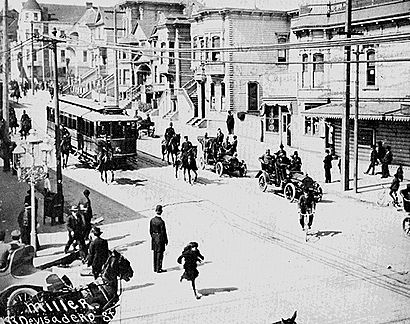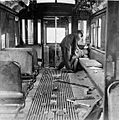1907 San Francisco streetcar strike facts for kids
Quick facts for kids San Francisco streetcar strike |
|||
|---|---|---|---|

San Francisco police escort a scab streetcar to protect it from the violence during the strike
|
|||
| Date | May 5, 1907 – mid-February, 1908 | ||
| Location | |||
| Goals | 8-hour day $3 per day |
||
| Methods | Striking | ||
| Resulted in | Unsuccessful; Carmen's Union Local 205 disbanded |
||
| Parties to the civil conflict | |||
|
|||
| Lead figures | |||
|
|||
| Casualties | |||
| Death(s) | 31 (25 passengers) | ||
| Injuries | 1100 (900 passengers) | ||
The San Francisco streetcar strike of 1907 was a very serious and often violent event. It happened when streetcar workers in San Francisco stopped working to ask for better pay and shorter hours. This strike was one of the most violent streetcar strikes in the United States between 1895 and 1929. By the time it ended, 31 people had died, and about 1,100 people were hurt.
Contents
Why the Strike Happened
This strike, like the St. Louis Streetcar Strike of 1900, happened during a time when many people wanted to make big changes in society. This period was called the Progressive Era. People wanted to improve how cities were run and make things fairer for everyone, including workers.
The Strike Begins
As the strike was about to start, Patrick Calhoun, a leader of San Francisco's United Railroads company, hired James A. Farley. Farley was known as the "King of the Strikebreakers." He brought 400 workers on a ship to replace the striking streetcar employees.
The streetcar workers, who were part of the Carmen's Union, began their strike on May 5, 1907. They wanted two main things:
- An 8-hour workday
- $3 per day in pay
Farley's hired workers, who were armed, quickly took control of the entire streetcar system.
Violence on the Streets
Just two days later, on May 7, the violence began. This day became known as "Bloody Tuesday." There was a shootout on Turk Street where two people died and about 20 were injured.
On May 25, something big happened. The city's mayor, Eugene Schmitz, who supported the workers, and Patrick Calhoun from the railroad company, both faced serious legal problems. On June 13, Mayor Schmitz was found responsible for misusing his power. He was replaced by Edward Robeson Taylor.
This change in leadership made things much harder for the striking workers. Most of the city's newspapers stopped supporting the strike. Only one newspaper, the Daily News, continued to back the workers. The strike slowly lost its strength in November and officially ended in mid-February of the next year. The Carmen's Union Local 205, which organized the strike, was then closed down.
What Happened Afterward
The strike had a tragic cost. Out of the 31 people who died from shootings and streetcar accidents, 25 were passengers. Also, 900 of the estimated 1,100 people who were injured were passengers.
Years later, in 1916, a San Francisco labor leader named Thomas Mooney tried to start the Carmen's Union again in San Francisco. This effort was a step towards his famous trial later that same year.
Images for kids
 | Claudette Colvin |
 | Myrlie Evers-Williams |
 | Alberta Odell Jones |




